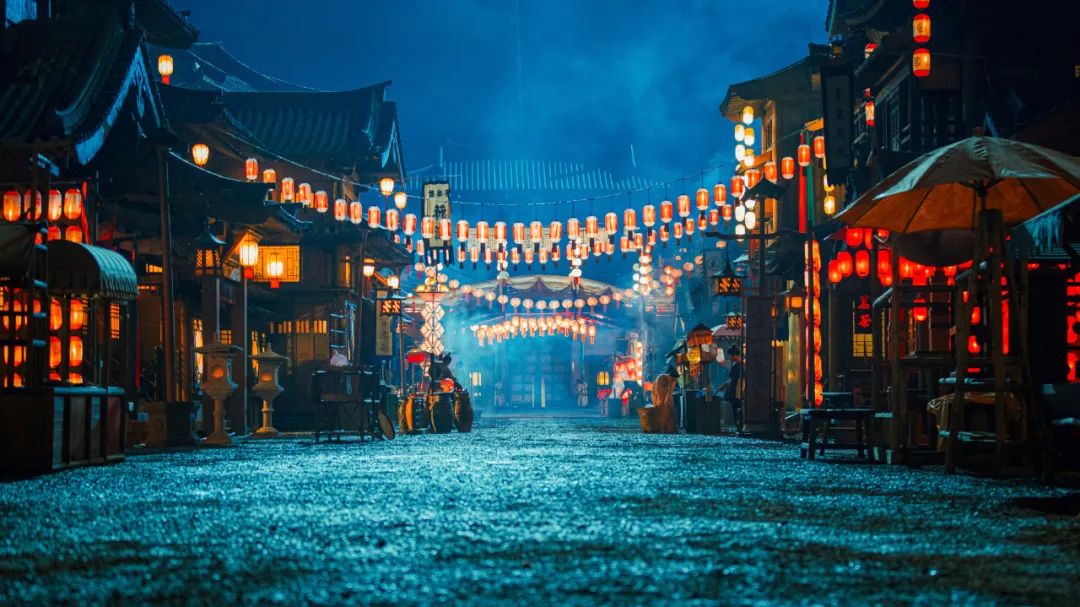Source: Pantry on the 3rd floor
"The Wind Rises Luoyang" ushered in the finale on the 29th. Luoyang, a famous historical and cultural city that has been the capital of 13 dynasties for more than 2,000 years, but is slightly lonely in modern times, this time shows its historical style, cultural customs and humanistic charm through film and television works. In fact, it is not just "The Wind Rises in Luoyang" - the "young" art of film and television is only more than a hundred years old, but it is inextricably linked to the "older" famous city attractions. In terms of "endorsing" the cities and mountains that have shone in China's five-thousand-year history, historical dramas and costume dramas can often play a role that is difficult for other types of film and television works to achieve.

"The Wind Rises in Luoyang"
The "collision" between costume film and television dramas and famous cities initially seems to have happened inadvertently. In 1961, the historical film "Peach Blossom Fan" produced by the Shaw Brothers Company in Hong Kong and set on both sides of the Qinhuai River in Nanjing swept the mainland, Hong Kong, Taiwan and Southeast Asia, awakening the longing of many Chinese people for the scenery of Jinling; in 1960, the costume film "Liu Sanjie", produced by Changchun Film Studio and filmed on location on the Li River in Guilin, made the Guilin landscape of "Jia Tianxia" more famous at home and abroad; Zhao Yazhi participated in two costume TV series "The Legend of the New White Lady" and "Joke about Qianlong", which cleverly made Hangzhou's West Lake and Chengde Summer Resort clever "Embedding";
The Legend of the New White Lady
Released in 1987, the Sino-foreign co-production "The Last Emperor" won 9 Oscar awards that year, introducing the magnificent Forbidden City in Beijing to a group of foreign audiences who were not familiar with traditional Chinese culture.
The Last Emperor
In addition, the two historical film masterpieces "Burning the Yuanmingyuan" and "Hanging Curtains to Listen to the Government" have brought about the "Yuanmingyuan topic", which has promoted the establishment and protection of the Yuanmingyuan Ruins Park to a certain extent, and its cultural influence has continued to this day. The TV series "Dream of the Red Chamber", which once held an actor training class in the Yuanmingyuan Relic Park, even stirred up the "Grand View Garden" in Beijing and Shanghai, which were originally "high imitation" and other scenic spots outside the filming.
The same successful, classic, but often unnoticed "historical dramas, costume dramas with hot city attractions" is a modern historical theme. For example, the theme of Shanghai's "Ten Mile Ocean Field", whether it is various late Qing Dynasty, Republic of China gangster films, and commercial war films in the early years of Hong Kong, or anti-special films in the early years of the mainland and spy war films in recent years, film and television interact with the history and culture of the city and reflect each other. Many film and television works set in Nanjing, the former capital of the "Republic of China", have also promoted the construction and development of characteristic cultural blocks such as Nanjing's "1912". For more than half a century, there have been many film and television masterpieces of this "shallow historical theme", and the complementary relationship with the city is also very distinct.
The interaction between costume dramas, historical dramas and famous cities, from the perspective of effect, can usually be divided into two types: one is the "city hot drama", which is usually because the background city and scenic spots in film and television works are "very large", and have long formed a recognized reputation. As long as the story, plot, actors and other aspects of the film and television dramas filmed with it as the background are guaranteed, it is easy to be tropical fire by the "famous city attraction effect", such as "The Wind Rises in Luoyang", "The Twelve Hours of Chang'an" and other recent popular dramas have this feature.
The Twelve Hours of Chang'an
There is also a kind of "hot city with drama", the original background city, scenic spots are not popular, but with the help of popular film and television works filmed in the local area " a hit", such as the 2012 TV series "Mufu Fengyun", it brings a series of "semi-cold and lukewarm" attractions in the ancient city of Lijiang, Yunnan, so that it quickly merges into the torrent of "net red punch card attractions".
Interestingly, this linkage effect between costume films and famous cities is sometimes "heart-planted flowers and flowers, unintentional willows shaded". Still taking the "Wooden House" of Lijiang Ancient City as an example, "Wooden House" makes it a blockbuster, but the costume film "Qian Wang", which has invested more and the team is more famous earlier, is also filmed here, but in exchange for the embarrassment of "the drama scene is not red".
"Wooden House"
With the advent of the Internet era and the era of "targeted delivery" and "tailor-made", the "mutual catalytic effect" between costume films, historical films and famous cities has been deliberately created from the beginning of the blueprint, which can be said to be more and more, but can it really maximize the effect if it is too deliberate?
A few years ago, a relative and friend of the author hoped to shoot a costume TV series based on the "Wu YueGuo" of the Five Dynasties and Ten Kingdoms period, through the "drama scene interaction" itself and a series of Zhejiang historical sites such as Hangzhou Old Town and Lanxi Zhuge Village. As a result, because the investment effect did not meet expectations, the original grand idea was "discounted" into an ordinary commercial soap opera, and the original intention of "drama interaction" was not realized - which seems to confirm that "drama interaction can not be sought".